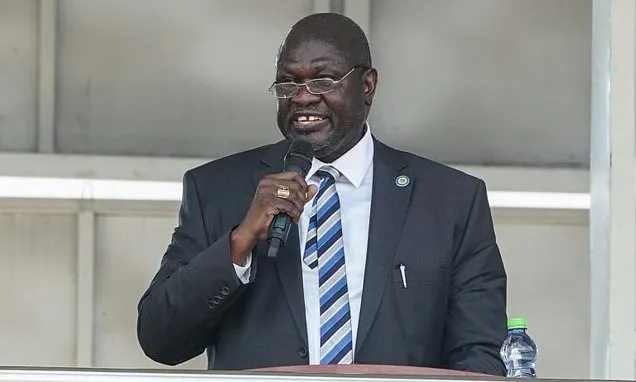Riek Machar is a veteran rebel who has survived years of bush warfare, assassination attempts, and exile and now faces charges of treason and crimes against humanity.
Until this month, Machar was South Sudan's first vice-president under a fragile power-sharing agreement designed to stop the country slipping back into civil war.
But the perennial number two of South Sudanese politics was stripped of his place in the unity government and faces years in prison over his alleged role in an attack on government forces earlier this year.
Machar's supporters accuse the government of President Salva Kiir of cooking up the charges to sideline him and consolidate power.
Such tensions are nothing new to Machar.
Analysts say his charming gap-toothed smile and easy-going manner mask a deep capacity for anger and ruthlessness, nurtured during years spent battling for power and survival.
Born in 1953 in the oil-producing state of Unity, Machar was the son of a chief in the Nuer community, a cattle-keeping people who are the country's second-biggest ethnic group after the Dinka.
He never underwent the traditional deep horizontal forehead scarring that is a rite of passage for Nuer boys as they come of age, and he was sent to school instead of the cattle camps.
After earning an engineering degree in the Sudanese capital Khartoum, Machar gained a doctorate from Britain's University of Bradford.
He returned home when civil war erupted between Sudan's north and south in 1983, becoming a leader for his fellow Nuer within the rebel army that had been dominated by Dinka forces.
Tribe against tribe
Machar grew frustrated with rebel commander John Garang and staged a failed 1991 coup against him and other commanders, including now-president Salva Kiir, who would become his long-time rival.
As the rebel army split along ethnic lines, Machar was accused of carrying out a massacre in the Dinka-dominated town of Bor in 1991, considered one of the worst atrocities of the war.
This sparked a cycle of revenge and violence between the two ethnic groups that has persisted for decades, despite their similar culture and widespread inter-marriage.
Machar formed a breakaway faction and signed a deal with his former enemies in Khartoum but the agreement did not hold and he rejoined the insurgents in 2002.
A peace deal was finally struck between Khartoum and the southern rebels in 2005 that would eventually lead to the south's independence in 2011.
Machar became vice-president, serving under Kiir.
The wily strategist sought to rebuild his reputation by leading failed efforts to persuade Uganda's notorious Lord's Resistance Army (LRA) rebels to end their decades-long insurgency.
Civil war
In the world's youngest nation, things were quickly turning sour.
Tensions rose with Khartoum over sharing the south's oil resources, triggering an economic crisis in what was already one of the world's poorest countries.
Machar declared he would run for president in the first elections in 2015, leading to him being sacked along with several allies in July 2013.
In December 2013, Machar openly challenged Kiir, calling him "dictatorial". Days later, gunfire erupted in Juba. The government claimed it was a coup bid by Nuer soldiers, while Machar said it had been Dinka soldiers aiming to massacre the Nuer.
A vicious civil war erupted, characterised by ethnic massacres reminiscent of the 1990s.
Fragile peace
After several failed peace attempts, a power-sharing agreement was finally forged in 2018 which saw Machar return as vice-president under Kiir two years later, though the relationship remained strained.
"We talk. We are not as close as we used to be, simply because he's unpredictable," Kiir told Kenyan TV at the time.
Attempts by the international community to foster a democratic transition have failed.
Elections have been repeatedly postponed, the two sides have never merged their armies, and the United Nations has reported massive corruption by the government.
After a Nuer militia attacked an army base in Upper Nile State in March 2025, Machar was placed under house arrest and dozens of his allies were arrested.
In September, Machar was charged with treason, murder and crimes against humanity over the attack.
His supporters say it is an attempt by Kiir to remove him from the political scene and called for an armed uprising to bring about "regime change".
